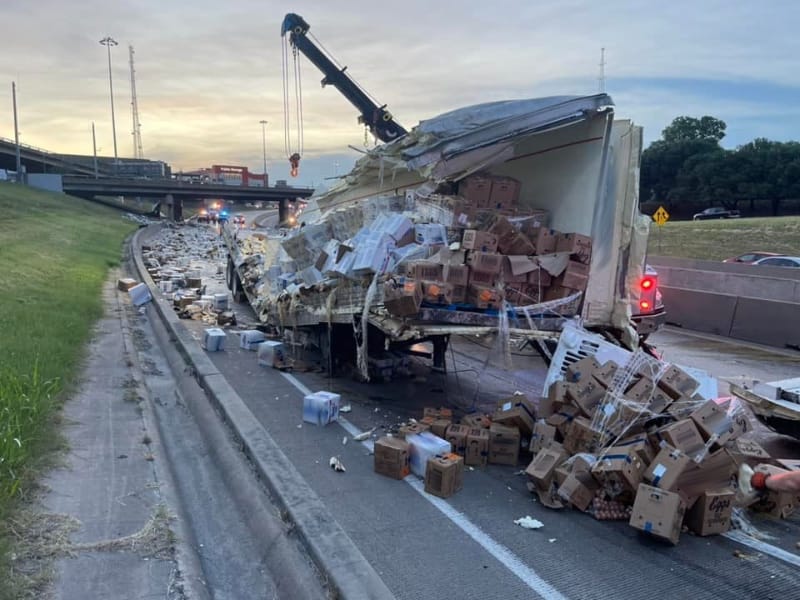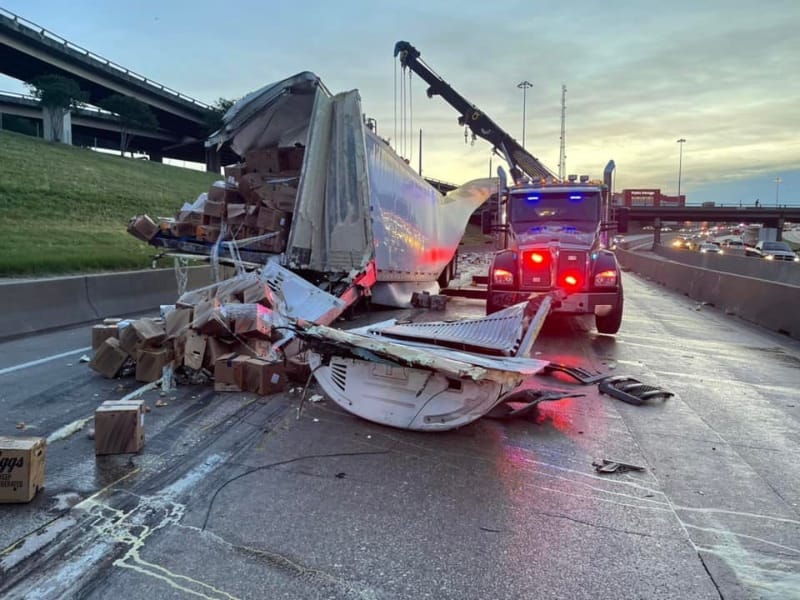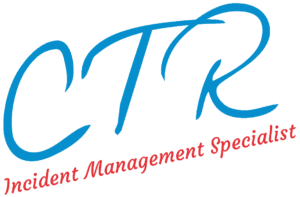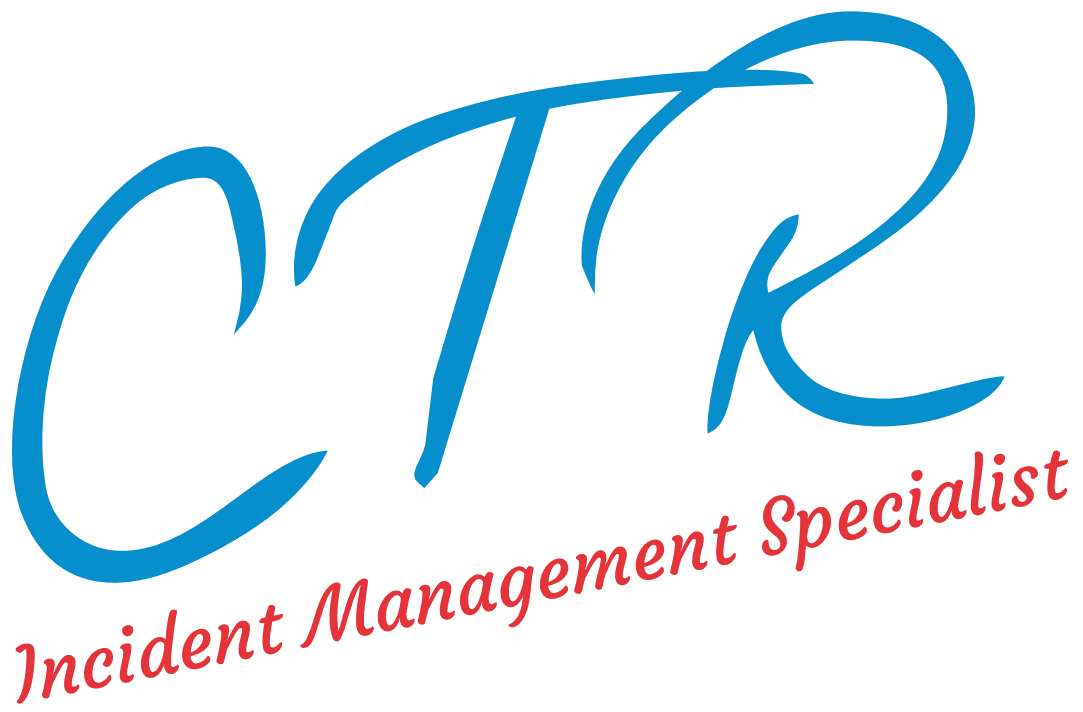Cargo on the Pavement Means Trouble for Everyone
It starts with a screech, a shudder, and then chaos. A semi loses control on the highway—maybe it jackknifes, maybe it’s hit from behind—and the trailer bursts open like a can under pressure. Boxes spill, pallets tip, and before long the road is a debris field. Traffic slams to a stop. Horns blare. Drivers swerve around cardboard, crates, or twisted metal.
When a semi crashes and the trailer splits open, it’s not just freight that hits the road. It’s the schedule, the delivery route, and the safety of every driver around. Spilled cargo is a mess and a hazard that can shut down entire lanes and leave traffic at a standstill. In those moments, our heavy tow trucks roll out, ready to start our Dallas cargo transfer service and the race against time.

When Minutes Turn into Miles of Delay
The scene doesn’t look like much at first: just flashing lights in the distance. But as drivers inch closer, they see it: a torn-up trailer slumped across the asphalt, its cargo strewn like confetti across the lanes. Cardboard torn open, plastic wrap flapping in the wind, metal shelving or crates tipped and broken. The shoulder is barely passable, and cones stretch back for miles. Engines idle. Tempers rise.
From our side of the tow line, we know how fast situations like this unravel.
The longer cargo stays on the road:
- Delivery delays stack up.
- Wrecked freight becomes unsalvageable.
- Drivers stuck in backup get restless—and reckless.
- DOT and law enforcement pressure increases.
Every minute that cargo clogs the lanes adds risk. Whether it’s food, building supplies, or machinery, once it’s on the ground, it becomes a hazard no one can ignore.
Dallas Cargo Transfer in Action
But we’re ready to step in. Our cargo transfer team is trained to move fast: safely and thoroughly. We can work Dallas cargo transfer calls on interstates, two-lane roads, and industrial sites. We move quick, stay alert, and work with what we’ve got.
Our response depends on the situation, but it often includes:
- Assessing the stability of the trailer and load.
- Using forklifts, pallet jacks, or hand-loaded methods depending on access.
- Coordinating with law enforcement and DOT to keep the site secure.
- Moving freight onto another trailer or to a secure holding site.
If the trailer is upright but unstable, we brace and support it. If it’s on its side, we work in shifts, recovering freight piece by piece before we even attempt a roll. Either way, the priority is to get the road clear without sacrificing safety or losing cargo.
The Ripple Effect of Delayed Transfer
Delaying Dallas cargo transfer has a domino effect. We’ve seen minor spills turn into full shutdowns just because no one acted fast enough. Here’s what gets impacted:
- Shippers lose inventory: Rain-soaked pallets and broken containers mean ruined goods.
- Carriers lose hours: A stuck truck is a truck off the clock—and off the route.
- Drivers lose patience: Delays increase the risk of secondary collisions.
- Law enforcement gets stretched: Officers can’t open roads until cleanup is complete.
A spilled load is a hazard, but it’s also an opportunity to fix the problem fast and before it grows. That’s the mindset we bring to every call.
Dallas Cargo Transfer FAQ: Fast Response for Spilled Loads
1. What is cargo transfer in trucking?
Cargo transfer is the process of removing freight from a damaged or disabled trailer and loading it onto another trailer or secure vehicle so the road can be cleared and deliveries can continue.
2. Why is cargo transfer so urgent after a highway spill?
Every minute spilled cargo stays on the road:
- Traffic backups get worse and secondary crashes become more likely
- Goods get damaged by weather or vehicles driving through debris
- Carriers and drivers lose valuable hours waiting for the route to reopen
- Law enforcement can’t safely reopen lanes until the load is cleared
Fast transfer protects freight and gets traffic moving again.
3. What kind of incidents usually require cargo transfer?
- Trailer rollovers or jackknife accidents
- Collisions that rupture or split open the trailer
- Fires or mechanical failures that leave a trailer unstable or unsafe
- Situations where the trailer is intact but can’t continue the trip
4. What equipment is used during Dallas cargo transfer calls?
CTR Towing Service uses:
- Forklifts and pallet jacks for intact, palletized goods
- Hand-load crews for loose or damaged cargo
- Secure temporary trailers or storage sites for freight that can’t go back on the original trailer
- Bracing and stabilization gear to keep a damaged trailer safe during the operation
5. How do crews keep the scene safe during cargo transfer?
- Coordinate with law enforcement and DOT for lane closures and traffic control
- Mark off a secure work zone with cones and lighting
- Stabilize the trailer before unloading to prevent shifting or collapse
- Work in teams to reduce time spent in live traffic zones
6. What happens if the trailer is overturned?
Crews often remove cargo piece by piece before uprighting the trailer. This prevents further damage to freight and reduces the risk of the trailer tearing or twisting during recovery.
7. Can cargo transfer save the load after a spill?
Often, yes. Quick action can salvage much of the freight before it’s damaged by weather, traffic, or impact. The faster the transfer, the less inventory is lost.
8. How does a delayed response affect everyone involved?
- Shippers: lose inventory from damaged freight
- Carriers: lose hours and revenue with a truck stuck off-route
- Drivers: face long waits in traffic, increasing the risk of secondary collisions
- Law enforcement: stays tied up at the scene until the load is cleared
9. What should drivers or dispatchers do while waiting for a cargo transfer crew?
- Pull over as safely as possible and set out warning triangles or flares
- Keep the area around spilled cargo clear
- Provide responders with details about the type of cargo and trailer condition
- Stay in touch with dispatch to update law enforcement and the transfer team
10. Why call CTR Towing Service for Dallas cargo transfer?
Because we:
- Respond quickly to minimize traffic delays and cargo loss
- Bring the right equipment and experienced crews for any spill size
- Prioritize safety for all road users and workers on-scene
- Work efficiently to clear the lanes, save the load, and reopen the road

CTR Towing Service: Our Dallas Cargo Transfer Service Keeps Dallas Moving
We know cargo doesn’t belong on the road and traffic doesn’t wait. At CTR Towing Service, our Dallas cargo transfer team answers the call when a load spills and the road shuts down.
Our Dallas cargo transfer team’s goal is simple: clear the mess, save the freight, and open the road. We bring skill, gear, and a mindset tuned for speed and safety. Spilled cargo may start the problem, but we’re the ones who bring the solution.
The next time a trailer cracks open and freight hits the pavement, remember: the clock’s already ticking. We’re ready when it does.

